I don’t what’s so red-bandy about this Wanted trailer. The only concern I have at this point is that I’m getting really tired of Morgan Freeman delivering one phone-in performance after another for another fat paycheck. I love his mellow zen quality but he’s done the wise old smoothie thing too much and it has to stop. He’s becoming Robert De Niro.
Suddenly
What a shock about Tim Russert…good God. The 58 year-old Meet The Press host was recording voiceovers for the upcoming Sunday show earlier today when he collapsed and died. I’m not finding the cause but I would guess a heart attack. The NBC News’ Washington bureau chief and moderator of Meet the Press, shrewd and whip-smart and always with the smile and the charm, was 58.
Former NBC anchor Tom Brokawmade the on-air announcement around 20 minutes ago — 12:40 pm Pacific. He reported that Russert had collapsed and died early this afternoon while at work. Russert had just returned from a brief vacation in Italy with his family.
Russert was large and beefy but was far from what anyone would call “a guy with a major weight problem.” Very strange and shocking. Boomers with weight issues are probably convulsing coast-to-coast right now, wondering what they should change about their diet or their life. Sometimes your number is just up. Death knocks, the door opens and you’re gone. No time for a farewell note or goodbye wave…bam.
A N.Y. Times account says that Brokaw said “this was one of the most important years in [Russert’s] life, with his deep engagement in the network’s political coverage” and that he “worked to the point of exhaustion.”
Russert became Meet the Press moderator in December 1991. In 2008, Time Magazine named him one of the 100 most influential people in the world.
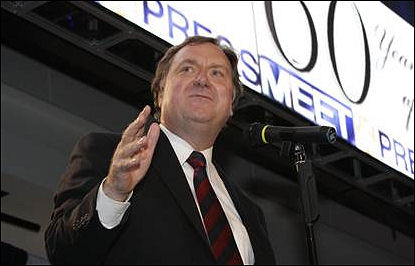
Jesus…now Russert will never know how the election will turn out — what the margins will be, which states will break for Obama, etc. Wherever he is, I’ll be he’s at least a little bit pissed about this. I would be if I were he. The force on the other side of the river who pushed the button on Russert should have at least waited until after November. Bad form, Mr. Death.
I’m also half-persuaded, however, that once you’re gone you’re on a cosmic plane that is so far above and beyond the day-to-day of the planet Earth that such thoughts never cross your mind, if your post-death consciousness can be said to be graspable by a “mind,” which is probably not the case.
I’m watching NBC’s Andrea Mitchell talk about Russert and how he began to address her one day by her nickname of “Mitch,” and she just crumbled a bit. She held onto her composure but her voice cracked and her eyes watered over.
Notes on Beatty Thing
Last night’s AFI Warren Beatty tribute at the Kodak theatre, which lasted three and a half hours, was an exceptional evening even by the emotionally gushy standards of such affairs. Or so says Pete Hammond, who’s been to several of these shebangs over the years. A fantastic list of A-level talent and heavy-hitters, and much eloquence and with and warmth.
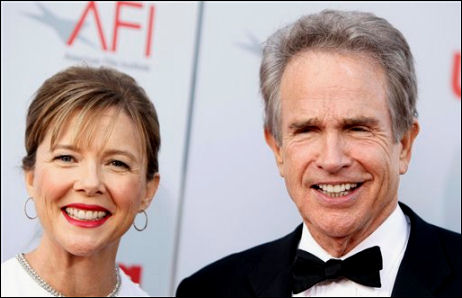
Here are some random notes which I’m not going to even try to shape into an article. This is just one recollection, and I’m not going to call over town to verify every last detail but most of this is probably on the money.
“Taped tributes from Barbra Streisand, Gene Hackman, Mike Nichols, James Toback, Goldie Hawn, Julie Christie and John McCain were played. There were specially shot clips of Beatty talking about his career that ran all through the show.
“The old legendary girlfriends from way back weren’t there, live or on tape — no Leslie Caron, no Michelle Phillips (or at least, I didn’t see her), no Britt Eklund, no Joan Collins. Poor Natalie Wood is dead, of course.
Nobody mentioned or even privately discussed Peter Biskind‘s long-gestating book about Beatty, Hammond said, so I called Biskind to see how things are going. Fine, he said. He’s finished Part Two, which starts with the making of Shampoo and obviously moves on to the present. Part One — early life, starting out, early career — is tougher because so many people who were around are dead. But the plan is to have it out by the fall of 2009.
“Al Pacino, Jane Fonda, Jack Nicholson, Dustin Hoffman, Diane Keaton, Quentin Tarantino, Robert Towne (who once showed me a “fat farm” version of a script he wrote for Beatty’s Love Affair that was much better than the version that was ultimately shot) and Halle Berry delivered live remarks,” Hammond reports.
“The show opened with Earl Scruggs and some bluegrass banjo players, in tribute to Bonnie and Clyde. The first person on, I think, was Jane Fonda. She never made a film with Beatty but said that Warren and she “did a screen test together for a Joshua Logan film that was never made.” Nicholson showed up in shades a long black coat, looking a little tattered. Pacino presented the actual award to Beatty. Keaton said that of all her screen moments, she was proudest of the “don’t leave me” train station scene from Reds.
“George McGovern was there, Bill Clinton was there, Gary Hart was there. it was kind of a McGovern campaign revival. Warren Christopher, Jerry Brown. Clinton came on, looked great and gave this amazing speech, mentioning Bulworth as an important film to him. USA Today’s Anthony Breznican and Variety‘s Anne Thompson were there.
“Near the honoree’s table, Beatty hugged sister Shirley MacLaine for the longest time…they just stood there and hugged and didn’t let go.
“Somebody — it may been Don Cheadle — somebody came out and said that as directors, Clint Eastwood and Warren Beatty are together typically require 140 takes per scene — Eastwood does one and Warren does 139.
Tarantino, whom Beatty blew off as far as playing the lead role in Kill Bill was concerned, “said W.B. represents the kind of thing that Hollywood isn’t any more,” says Hammond. Dustin Hoffman went on forever. Michael J. Pollard came up and said something colorful and incoherent, which was kind of cool.
The gift bag “was a collection of Beatty movies on DVD” and one of those video table frames that runs a slide show of different shots.
There was one clip shown from The Fortune. Lee Grant, who at one time was apparently working on a documentary portrait of Beatty, was not there. Ishtar director-writer Elaine May, says Hammond, was there also.
Nobody mentioned Barack Obama the entire night. What…out of deference to Beatty’s friendship with John McCain?
Beatty thanked the film industry for leading him to wife Annette Bening, “who has given me the most important thing of all, which is her love.” He said he was “particularly humbled by the presence” of McGovern, Hart, Brown and Clinton, and at one point described himself as “an old-time, unrepentant, unreconstructed, tax-and-spend, bleeding-heart, die-hard liberal, liberal, liberal Democrat.”
The event was a drinks-and-dinner deal that involved unscrewing and removing most of the seats in the orchestra to make room for tables. A much abridged version of the Beatty tribute — what, 90 minutes’ worth? — will air 6.25 on the USA Network at 9 pm.
Two Worlds
I was mildly jolted by a paragraph in Katherine Q. Seelye and Julie Bosman‘s 6.13 N.Y. Times piece about allegations of a sexist slant in the coverage of Hillary Clinton‘s campaign, to wit: “The cable networks do not reach as many viewers as the broadcast networks — 2.6 million per night for prime-time news programs on cable compared with 23 million for broadcast — but their coverage runs in a continuous loop, is amplified by the internet and is seen by many people involved in politics.”
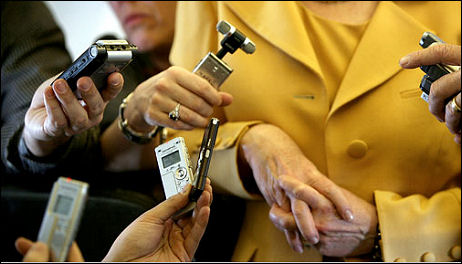
It felt comforting on some level to spot my little Olympus digicorder in this shot taken during a news conference aboard Hillary Clinton’s plane.
In other words, the cable-satellite TV information world that I and everyone I know lives in — MSNBC, CNN, CNBC, CSPAN, etc. — is absorbed by only one ninth of the viewing population. One viewer out of nine. So the vast majority out there are…what, people who watch TV in their kitchen or bedroom with a roof antenna or a metal coat hanger for reception? Who are watching…what, Fox News, The View, Access Hollywood and their local Stepford news hour for updates?
How much smaller is the percentage of those who (like me) constantly keep up with the news cycles online via laptops and handheld devices compared to the average 20th Century slow-boater living in Nickleodeon world and driving a car that needs a new muffler? People who go to their kids to look at this or that online but otherwise haven’t a clue? (John McCain admitted a day or two ago that he doesn’t know how to use a computer.)
Every time you take a hard look at things it comes down to the same equation — a small percentage is paying real attention to what’s going on, and the vast majority is walking around in a kind of narcotized broadcast-media head space. What happened to the idea of a 21st Century information revolution and the resultant strengthening of our democracy? It can’t begin to happen with the levels of relative ignorance being what they are these days.
It would be one thing if, say, half the population was absorbing cable and wireless news sources and the other half constituted the media underclass, but when you’ve get eight out of nine still watching broadcast TV and shuffling around the house in their hush puppies…good God. And people wonder why this is essentially a Red country with tiny little Blue nerve centers in and around the big cities.
The Long One
A non-USA exhibition source told me this evening that The Dark Knight‘s running time has been confirmed at 152 minutes.
HE reader Mgmax has explained the evolution in two lines: “In the 1950s and early ’60s we had long, self-important movies about Jesus. In the 21st Century we have long, self-important movies about Batman.”
All Right…
Tapping out my Incredible Hulk feelings didn’t pan out. I’ve been saying to myself for the last six or seven hours, “I really should write this…c’mon, push it out.” It’s not a very interesting film to discuss because there’s not much going on beneath it. But it’s very efficient and it looks good and it moves right along, and as such is a much more satisfying sit than the one provided by Ang Lee five years ago. No one is going to feel burned.
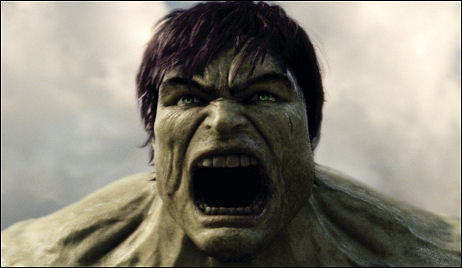
Is it as good as Iron Man? I felt the same way about both, which is that neither is worth doing back-flips over, but they’re both diverting, lean and mean, good enough, well crafted, etc.
I loved that that it’s not another origin story…thank God! The most absorbing part takes place during the first 25 minutes or so, when Bruce Banner (Ed Norton) is hiding out in Rio de Janeiro and working at a soft-drink bottling plant and living in a grubby little apartment in a huge and fascinating hillside favella. The worst part is the big Hulk vs. Hulk fight at the end…boring. Heavy-duty fights between powerful monsters are completely boring unless one of the combatants has some kind of advantage over the other. It’s like watching a battle of bad heavy-metal bands.
Norton’s Banner is first-rate — much less mopey and more than down-to-it than Eric Bana‘s. (Sorry.) Bill Hurt, the big military villain, looks freakish with a wiggy-looking wig and a stupid fake moustache. He looks like an ogre out of a Grimm Fairy Tale by way of Terry Gilliam.
Poor Tim Roth does an okay job as the Hulk’s nemesis, but his head is growing larger and larger the older he gets — he’s looking like one of those bobbing-head football dolls — plus his nose is getting bigger, his shoulders are way too narrow and he seesm to be as short as Dustin Hoffman. (He looks like a midget standing next to Hurt, and Hurt is no giant — I’ve stood next to him myself.) Liv Tyler does a solid professional job as the girlfriend.
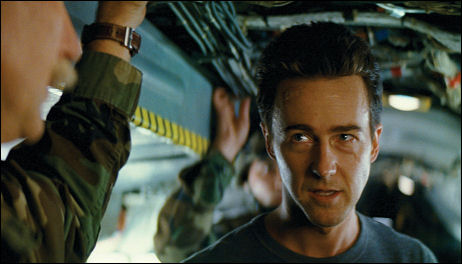
Tracking
The big tracking news of the day is that Will Smith‘s Hancock, which doesn’t open for another two weeks and six days weeks, is 76 general awareness 47 definite interest and 11first choice. That’s a very strong number.
The Incredible Hulk is at 98, 36 and 21 — the weekend’s sure winner due to the under-25 males. M. Night‘s The Happening is running at 76, 39 and 19 — figure a weekend gross in the low 20 million range. Older women are at 25 first choice on this puppy. Get Smart, out next weekend, is at 85, 35 and 8 — not bad. But Mike Myers‘ The Love Guru is running at 84, 24 and 4…bomb.
Anti-Smear Site Launched
The new site aimed at fighting the various racist, right-wing smears about Barack Obama went up today. It’s nicely designed and easy to read. Even the most deeply dug-in Appalachian dumb-ass can follow it. But of course, most of the rural brainiacs out there will never read it because they’re deeply invested in the foxholes they’re living in and they aren’t about to climb out of them for something as insubstantial as fact. God help these people, but they’re in those holes because they feel like home sweet home.
MSNBC’s Chris Matthews today recalled an exchange between a reporter and some overweight working-class guy from Ohio after the latter said he’s heard Obama is a Manchurian Candidate Muslim. The newsman said, “You know that’s not true, right?” and the guy replied, “It is to me.” What can you do with people like this? The only permissible thing is to say “these people have tough lives, they pay their taxes and they deserve respect.” Right.
Sudden Impact
A trailer for Spike “shut yo’ face” Lee‘s Miracle of St. Anna (Touchstone, 9.26). Directed by Lee, costarring Derek Luke, Michael Ealy, Laz Alonso, Omar Benson Miller and Matteo Sciabordi. An old black guy in a bank (or something similar to a bank) keeps a gun with live rounds in a nearby drawer in case of emergencies? Banks or what-have-you allow this to happen?
Good Fellow
Congratulations to Warren Beatty for being honored with the 36th AFI Life Achievement Award. The ceremony starts this evening at the Kodak theatre with drinks at 6 pm and dinner at 7 pm. Variety‘s Steve Chagollan has written a tribute piece called “Warren Beatty Perfected Art of Evasion,” and…oh, man, do I know the meaning of that!
I’ve been fencing on and off with Beatty for 15 or so years, and I’ve gotten next to nothing printable from the guy (98% of our chats have been OTR). And it’s been mostly okay because I’ve enjoyed the pleasure of the game that we play each and every time. And I love his flattery, which he throws at you from time to time. Not too much — he’s no glad-hander — but just enough to keep you sweet.
A couple of years ago at a party I reminded Beatty that our very first non-interview was in ’81, to which he replied, “Eighty-one? What were you, twelve years old?” I’ve never heard the words “how are ya?” spoken with more apparent feeling and sincerity than from he. There’s not a lot of different ways to massage those three words, but for whatever reason I’ve never forgotten his delivery. Knowing that it’s a bit that he’s practiced and perfected doesn’t matter, for some reason. Because he’s so good at it.
Staunchly, Admirably
The House Next Door‘s Vadim Rizov has written that Werner Herzog, director in preparation of the new, certain-to-be-outrageous Bad Lieutenant as well as the current Encounters at the End of the World, “makes me happier than just about any working filmmaker, even when his movies are nearly indigestible.
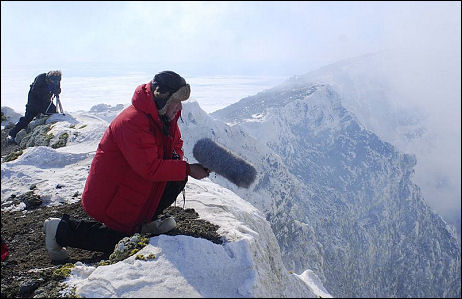
“There’s something about his complete confidence in his own views that makes me wonder, at least for a blissful moment, what all the fuss about moral relativism is. Like Honore de Balzac or Lars von Trier, he’s the final authority on the world around him, even when it’s a self-created one.
“Encounters At The End Of The World picks up where 2005’s The Wild Blue Yonder left off: under Arctic ice, cameras exploring the dirty Styrofoam-ish underside of the normally picture-pristine continent. The Wild Blue Yonder was essentially a garbled compilation doc, taking footage of Antarctica and outer space and imposing a half-assed sci-fi framework on them. Encounters begins with Herzog arriving on the continent to get his own damn footage.” And so on, etc. Entertainingly written.
Faded and Confused
About 40 minutes ago (i.e., just before 11 am Pacific), Slate‘s Kim Masters ran a response to yesterday’s press-release development in the story about why HBO decided to change the ending of Marina Zenovich‘s Roman Polanski: Wanted and Desired, to wit:
“Following up our report this week about the new Roman Polanski documentary, we take note of a weird statement released Wednesday” under the signatures of prosecutor Roger Gunson as well as defense attorney Douglas Dalton — the case’s two principle advocates.
“Both are featured in an HBO documentary, Roman Polanksi: Wanted and Desired, in which they bemoan the shabby treatment that alleged child rapist Polanski suffered at the hands of the Los Angeles Superior Court in 1977.
“As we reported, the documentary originally ended with the assertion that an unnamed judge in 1998 was going to permit Polanski to return to the United States without risking jail time, but only if he appeared at a court proceeding that would be televised.
“Last week, the Los Angeles Superior Court identified that judge as Larry Paul Fidler and vehemently denied that he had ever imposed such a condition. After a pause, HBO said Friday that it would change the end of the film to say that Polanski feared the proceeding would be televised, which is quite different from having a judge insist that it had to be.
“The altered documentary aired Monday. Yesterday, the film’s publicists released a statement signed by Gunson and Dalton contending that at the 1998 hearing, Dalton pressed ‘for a resolution of the case that would allow for minimal news media.’ The statement says Dalton ‘recalled that Judge Fidler would require television coverage,’ and then adds: ‘Mr. Gunson recalls television coverage discussed at the meeting.’
“Talk about lawyer words. There’s no further elaboration as to what, if anything, Gunson remembers about that discussion. The statement, based on this rather threadbare set of assertions, concludes that both lawyers denounce the court’s ‘false and reprehensible statement’ disputing the notion that Fidler demanded television coverage.
“No word from HBO on whether the film will be changed again.”

